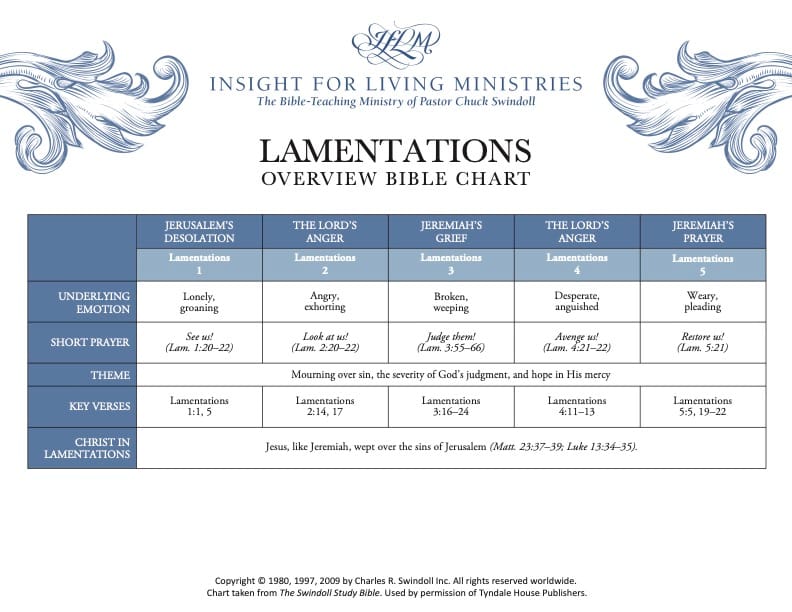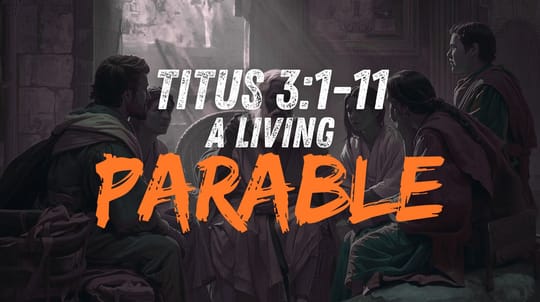Like a good detective, let's examine this book.

🔥 Overview
The book of Lamentations is a collection of five poems lamenting the destruction of Jerusalem by the Babylonians in 586 B.C. Traditionally attributed to the prophet Jeremiah, it expresses deep sorrow over the devastation, the exile of the people, and the consequences of sin. Despite its sorrowful tone, Lamentations also highlights God’s faithfulness, His justice, and the hope of restoration. The book is structured as a series of acrostic poems, except for chapter 5, which follows a more free-form style.
🔍 Things to Notice
- Acrostic Structure – Chapters 1, 2, and 4 follow an alphabetical acrostic pattern, where each verse begins with a successive letter of the Hebrew alphabet. Chapter 3 intensifies this by having three verses per letter, emphasizing the depth of grief.
- God’s Name Is Rarely Mentioned – While the book discusses God’s justice and mercy, direct references to Yahwehare sparse, reflecting the feeling of abandonment.
- A Funeral Dirge for a Nation – Lamentations functions as a corporate funeral lament for the fallen city of Jerusalem, mirroring ancient Jewish mourning practices.
- The Center of Hope (Lamentations 3:22-23) – Amidst sorrow, the heart of the book contains one of the most well-known passages:
"The steadfast love of the LORD never ceases; His mercies never come to an end; they are new every morning; great is Your faithfulness." - Echoes of Deuteronomy – The book highlights the fulfillment of covenantal curses from Deuteronomy (especially Deut. 28), showing that Israel’s suffering is not random but a result of disobedience to God’s law.
🙏 Jesus in this Book
(Every book reveals the glory of God, displayed in Christ Jesus)
- Jesus is the Man of Sorrows – Lamentations 1:12 says, "Is it nothing to you, all you who pass by? Look and see if there is any sorrow like my sorrow..." This echoes Isaiah 53:3, where Christ is called a "man of sorrows."
- The Suffering Servant – Like Jeremiah mourns for Jerusalem, Jesus wept over Jerusalem (Luke 19:41-44), knowing its future destruction.
- God’s Mercies Are New Every Morning – This foreshadows the gospel of grace, where Christ brings hope, renewal, and the steadfast love of God (Lamentations 3:22-23).
- Jesus Bears the Judgment of Sin – The lament of the people in Lamentations points forward to Jesus, who bore the full weight of God’s wrath for sin (2 Cor. 5:21).
👀 Themes
- Divine Judgment – Jerusalem’s destruction is a direct result of God’s judgment on sin.
- Suffering and Grief – The book gives voice to deep, national and personal sorrow.
- God’s Justice and Sovereignty – The fall of Jerusalem is not chaotic but a righteous response to covenant violations.
- Hope and Restoration – Despite the despair, God’s mercy remains, offering hope for future restoration.
- Repentance and Confession – The book calls for a return to the covenant faithfulness of God.
😀 Who?
Who wrote it? Jeremiah, son of Hilkiah.
Who is the original audience? The book is written primarily for the surviving Jewish people who experienced the Babylonian destruction of Jerusalem. It is a corporate lament and a call for future generations to remember sin's consequences and trust God’s mercy.
🪧 Where?
Where are we? It was likely written in or near Jerusalem shortly after its destruction, capturing the firsthand devastation of the city and temple.
⏳ When?
When was it written: Most scholars believe it was written shortly after 586 B.C., while the grief was still fresh.
🤔 What?
What is the big idea? Sin leads to judgment, but God’s mercies never fail. While the book mourns the destruction of Jerusalem, it also calls God’s people to trust in His faithfulness and restoration.
🧐 Why?
Why is this book important?
- Understanding Suffering – It teaches believers how to process grief, pain, and loss biblically.
- God’s Faithfulness in Judgment – Even when discipline comes, God remains merciful.
- The Reality of Sin – Lamentations reminds us that sin has real consequences.
- Finding Hope in Hardship – Christians can cling to God’s new mercies every morning.
- It points to Christ – Jesus is the ultimate hope and redemption from suffering.
📝 How?
How can I apply it?
- Learn to Lament – Bring your sorrows to God honestly, just as Jeremiah did for Jerusalem (1 Peter 5:7).
- Recognize the Consequences of Sin – Sin always has a cost, and we must walk in obedience to God (Romans 6:23).
- Trust in God’s Mercies – Even in suffering, God’s compassion never fails (Lamentations 3:22-23).
- Turn to God in Repentance – Like Israel, we must confess our sins and seek God’s restoration (1 John 1:9).
- Have Hope in Trials – Even when life feels devastating, God is still sovereign and faithful (Romans 8:28).
Resources
- The Bible Project: Lamentations Overview
- Enduring Word Commentary on Lamentations
- Blue Letter Bible – Lamentations
- ESV Study Bible Notes on Lamentations
- GotQuestions.org – What Is the Book of Lamentations About?
- Bible.org Study Series on Lamentations
- Ligonier Ministries: Lamentations
- Matthew Henry’s Commentary on Lamentations
- John MacArthur Study Bible Notes on Lamentations
- The Gospel Coalition’s Articles on Lamentations









